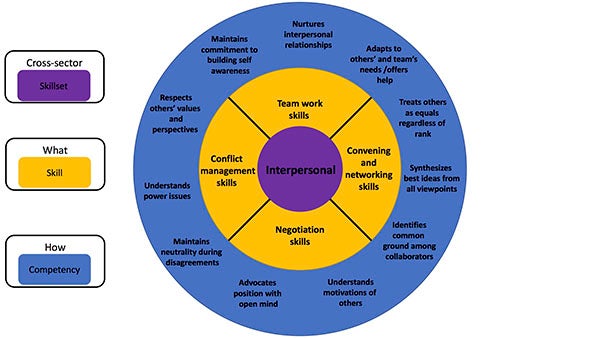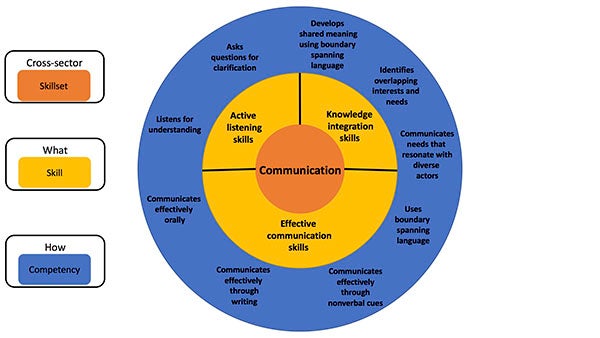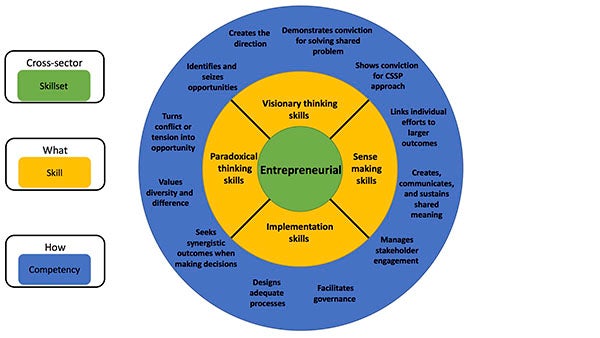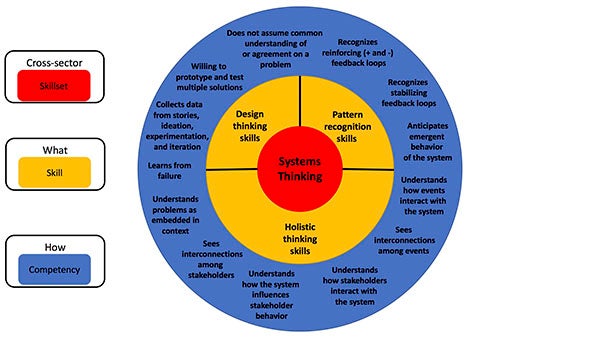Jan 02 2018 Often assumed and rarely addressed: Skillsets for effective cross-sector collaboration
 By Lea Stadtler, Grenoble Ecole de Management, France, and Adriane MacDonald, University of Lethbridge, Canada
By Lea Stadtler, Grenoble Ecole de Management, France, and Adriane MacDonald, University of Lethbridge, Canada
Addressing global challenges in today’s interdependent world requires innovative, sector-spanning efforts. This idea is in increasing circulation among the business, non-profit, and government communities internationally. But what is required of individuals to successfully engage in and manage cross-sector social partnerships (CSSPs)? Insights about cross-sector skillsets are critical not only for designing CSSP courses and training programs, but also for practitioners to self-evaluate and identify ways to improve their competencies.
To answer our research question, we analyzed academic and practitioner resources on cross-sector collaboration available via ResearchGate. Early in our process we realized that most of the material available is about the why, what, and how of CSSPs. Such explicit knowledge and insights about key questions and challenges related to the partnership life cycle are surely important for individuals to successfully engage in CSSPs (see, for example, the ARSP CSSP Teaching Toolkit and The Intersector Toolkit). But what about the tacit side of CSSP management — that is, the required skills and competencies?
Seeking to develop a roadmap for practitioner and teacher reference, we created a framework centered on four different yet interdependent requisite skillsets — interpersonal, communication, entrepreneurial, and systems thinking. For each of the four skillsets, we created a “Steering Wheel” that illustrates the skills at its core (the “what”) and presents the competencies (the “how” in terms of activities) around them, so as to form a coherent wheel to navigate the unspoken dimensions of CSSP management.
Interpersonal Skills
The interpersonal skillset centers on navigating the human relationship aspects of CSSPs. This includes skills such as convening and networking, negotiation, and team work, and conflict management. These skills are important to managing CSSPs because they enable individuals to establish common ground on a shared problem through an ongoing process of relationship building that validates and values different stakeholder perspectives.
Communication Skills
Communication skills and competencies are critical for establishing shared understanding and meaning among the often diverse CSSP partners. Getting the communication right involves active listening as well as clear articulation. More precisely, it’s about listening for comprehension, requesting repetition of opaque statements, asking clarifying questions, and summarizing positions and arguments to confirm comprehension, and thus shared understanding. These skills are closely linked to effective knowledge integration. Knowledge integration enables individuals to facilitate shared meaning by identifying overlapping needs and framing these needs with language that transcends sector boundaries.
Entrepreneurial Skills
Moving from relationship-related to project-related skills, it is no surprise that CSSPs require entrepreneurial skills. It is frequently up to the partners to pave the way and conceive solutions for which no established blueprints exist. Hence, the entrepreneurial skills outlined above rely on sense-making and visionary thinking to demonstrate commitment to and conviction for the CSSP effort, inspire others, seize upon relevant opportunities, and provide direction for the partnership. However, the manifold interests, conditions, and perspectives of partners are often not aligned. In this context, paradoxical thinking — another key component of the entrepreneurial skillset — helps individuals turn setbacks into opportunities and, where possible, identify synergistic solutions. Finally, entrepreneurship is about getting things done, related to implementation skills which enable individuals to develop inter-organizational structures and processes that help partners to interact, develop, test, and implement solutions.
Systems Thinking
Finally, critical to successful cross-sector collaboration is the understanding that the targeted issue and different actors are embedded in a larger system. Thus, systems-thinking skills are central to understanding the factors that contribute to a problem and for identifying and testing potential solutions. From this perspective, CSSPs require holistic thinking skills, interconnected with pattern recognition skills, for viewing a problem as part of a larger system. Design-thinking skills then help partners in the process of data collection and solution testing based on data driven ideation, experimentation, and iteration when defining and addressing a problem.
The Way Forward
The CSSP skillsets related to interpersonal, communication, entrepreneurial, and systems-thinking skills represented in our Steering Wheels should not be understood as a one-size-fits-all formula to partnership success. Rather, our Steering Wheels are meant to be used as a tool for practitioners to reflect on their skills and competencies, perhaps as a first step towards greater awareness in addressing personal weaknesses or further developing existing strengths. While CSSPs call for enhanced self-awareness, they do not call for superheroes excelling in all skillsets. Instead, greater awareness about the required competencies may help to build partnership teams in which member skillsets are complementary and cover the diverse skillsets.
For CSSP teachers and trainers, the Steering Wheels emphasize the importance of CSSP tacit knowledge, which requires innovative pedagogical approaches that complement more traditional approaches, focused on explicit knowledge. Educating current and future CSSP leaders thus requires instructors and trainers to be co-learners with participants; be problem definers first and solvers second; be facilitators of learning; be inquisitive; and be practice oriented (see also ARSP 7, pp. 21-25). Teaching for CSSP skill development calls for more interactive teaching tools, however such tools have yet to be developed or widely used in classroom environments. As part of the Annual Review of Social Partnerships team, we are committed to addressing this gap. If you want to learn more, please connect with us: lea.stadtler(at)grenoble-em.com and adriane.macdonald(at)uleth.ca.
Note: The full article is available in the Annual Review of Social Partnerships, issue 12, pp. 45-49.
Lea Stadtler works as Associate Professor of Strategic Management at the Grenoble Ecole de Management, France, and also contributes to the Geneva PPP Research Center, University of Geneva, Switzerland. In her research, Lea explores CSSPs in the light of coopetition, boundary management, and design challenges. Her papers have been published in journals such as Organization Studies, Journal of Business Ethics, and Business & Society, and she has received three international dissertation and case writing awards.
Adriane MacDonald is an Assistant Professor in the Faculty of Management at the University of Lethbridge. Her research focus is on multi-organization cross-sector social partnerships designed to implement community sustainability plans. As an instructor, Adriane has taught courses that focus on topics related to environment, business, CSR, and strategy. Outside of academia, Adriane has worked as a consultant for a design firm and as a business analyst for the Government of Canada.




